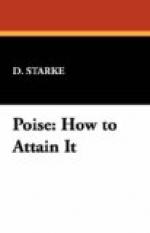The nature of a timid person is essentially artificial. His character is unequal.
He yearns for perfection, yet it is painful for him to meet it in others. He suffers also because he has failed to acquire it himself.
Sometimes he is his own most severe judge and then on other occasions he is grossly indulgent to his faults.
His isolation causes him to construct ideals that can not possibly be realized in ordinary life. But he is more than ready to blame those who fall short of them, while making no effort to duplicate their struggles.
He makes the sad mistake, as we have seen in the chapter on effrontery, of taking all his chimeras for realities and is angry at his inability to make other people see them in the same light.
He is, moreover, of a very trustful disposition and prone to the making of confidences. But when he attempts them his infirmity prevents him and he suffers under the inhibition.
All his mental processes, as we have seen, tend toward hypochondria, unless his sense of truth can be called into play.
One can easily see then that this daily self-examination can be made quite a difficult affair by all these conflicting tendencies.
It is for this very reason that it is so necessary that this examination should be rigorously undertaken every day and with all the good faith of which we are possest.
It is because they do not ignore their own weaknesses that the men endowed with poise become what one has psychologically termed “forces,” that is to say people who are masters of a power that renders them superior to the rest of the world.
RESOLUTION
After as minute and as honest an examination as we can make of our own actions, it will be of great benefit to make definite resolutions for the morrow.
This is a matter of great importance.
The timid man, by seriously resolving to perform the actions that he ought and by planning the accomplishment of some definite step, will unconsciously strengthen his own will-power.
He will increase it still more by making up his mind to leave no stone unturned to conquer himself.
For instance, he proposes to make a certain journey, or to pay a certain call, which he dreads very much, and falls asleep while repeating to himself: “To-morrow I will go there! I will carry the thing through with assurance!”
Conceding the magnetic power of words, the acquisition of courage and of confidence are necessary corollaries.
Ideas imprest upon the mind at the moment that one is falling asleep develop during the night by a species of incubation, and on the morrow present themselves to us quite naturally in the guise of a duty much less hard to perform than we had imagined.
In the case where such a resolution awakens an unpleasant emotion in the hearts of the timid, they should repeat earnestly the sentences that tend to composure and should seek the aid of the means we have indicated for attaining it.




